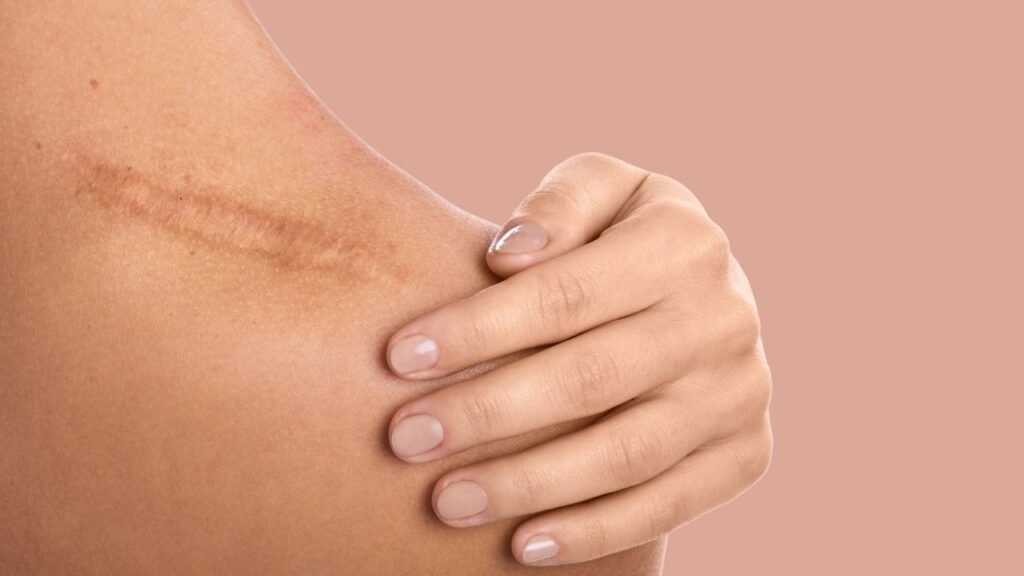How to Remove Scars From Face Permanently?

Table of Contents
Even when the stubborn acne heals, the scars are left behind on the skin. One can have acne scars on the face, chest, and back. Between the ages of 11 and 30, about 80% of people get acne. However, only one in every five of these people acquire scars.
Scar reduction involves either over-the-counter medicines or a dermatological treatment. This blog covers all the details about acne scars and some best ways to remove them.
Call Our Specialist
What are Acne Scars?
After acne occurs, the inflammation causes a bump on the skin. With time, the pore wall changes, pimples heal, but the scars remain on the skin.
Acne scars may be either a depression on the skin’s surface produced by tissue loss or a raised scar visible above the surface. This kind of acne scar indicates that your skin is working hard, but maybe too hard. Your skin produces collagen (repair tissue) to help cure acne scars, but too much collagen may create raised scars.
Atrophic or Depressed Scarring:
Following are types of scars that fall under this category:
- Ice pick: The shaft of an ice pick tool is broad and tapers to a point at the end. Acne scars that look like a tool have a broad opening at the top. They shrink as they descend deeper into the skin. One of the most difficult scars to get rid of is an indentation like this. They’re most prominent on the tops of your cheekbones and forehead, where the skin is thinner.
- Rolling: This scarring is more common on the lower cheekbones and jawline due to the thicker skin. The indentations on the skin have sloping borders, giving the appearance of wavy skin.
- Boxcar: Boxcar scars are raised indentations on the skin that give a more angular appearance. Those corners pierce the flesh like a knife through butter. Lower cheeks and the jaw are typical places to see these scars.
Hypertrophic or keloid scars:
Scar tissue growths protrude from the skin in the form of these lesions. Collagen fibers in the skin’s dermis are overgrown, resulting in these growths. These scars may be itchy, sensitive, or painful and can be seen on the chest, back, shoulders, or jawline.
How long does it take for acne scars to fade?
The answer depends on the scar and the treatment option you select. Ask your dermatologist about recovery time. Keep in mind that not all scars will disappear entirely.
Treatments for Acne Scars
There is no one cure for acne scars. Based on your scar kind, skin type, and scar severity, one or more of the following methods may help enhance your skin’s look.
- Home skincare: The use of sunscreen may help reduce the contrast between the two. Medicated lotions containing azelaic acid or hydroxy acids may also assist.
- Laser resurfacing: This method is becoming popular for resurfacing dermabrasion scars. People with darker complexions or a history of keloids are more susceptible to adverse effects.
- Dermabrasion: Usually used for severe scarring. It is done using a spinning brush or other instruments. Aside from surface scars, deeper acne scars may be less visible.
- Chemical peel: Your doctor uses a chemical solution to remove the top layer of skin and soften underlying scars. Mild and medium peels may be repeated for results. Changes in skin tone are possible, particularly with severe peels on dark skin.
- Skin needling: Your doctor uses a needle-studded device to roll over the skin to promote collagen production. Safe, easy, and potentially helpful for acne scars. It causes minor skin discoloration. The effects are modest and need repeat treatments.
- Surgery: Your doctor removes individual acne scars by punching excision and sutures or skin grafts the wound. Subcision involves inserting needles beneath the skin to release scar fibers.
Conclusion
Acne scars may be bothersome, but there are numerous treatments available. Most scars are permanent, but a healthcare professional can help you discover the appropriate therapy to fade them.
If you have stubborn acne scars that are not going away, you can consider taking a treatment. You can book an appointment with our experts to know the type of your scars and the treatment best suitable for you.
Recent Posts
Our Expert Doctors










